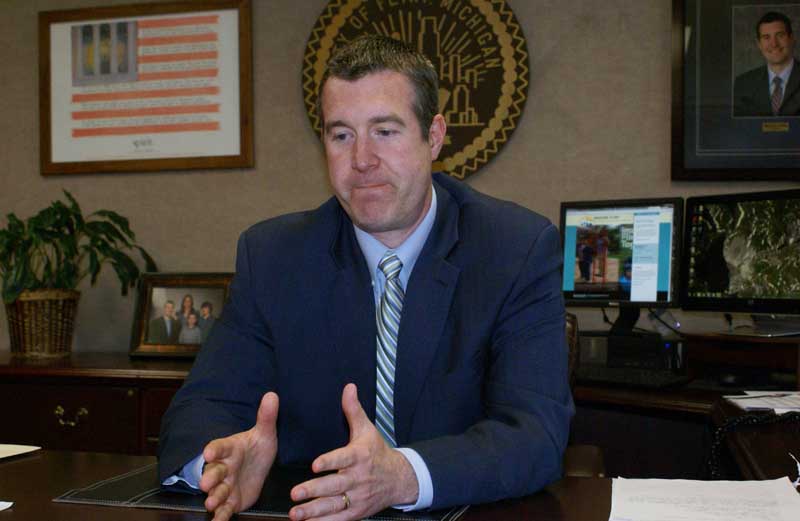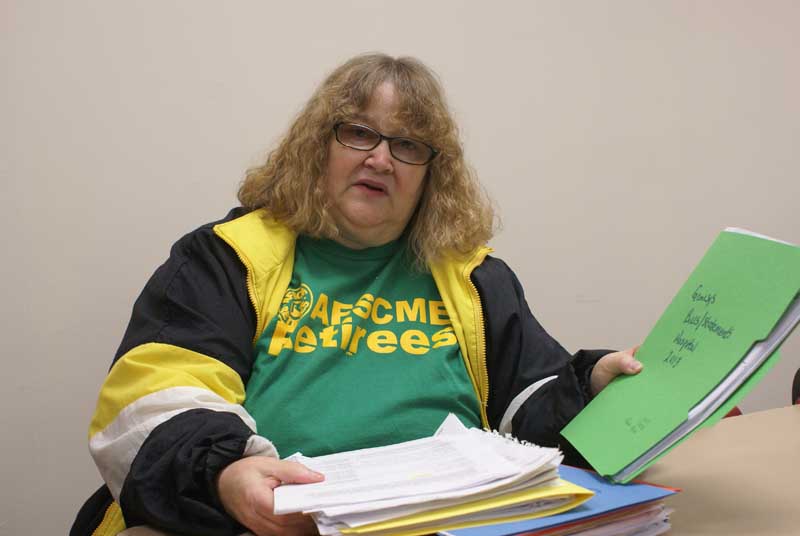In downsized Flint, desperate retirees vs. struggling taxpayers
When Patty Tokar’s husband, Steve, retired from Flint’s sewer department in 1996, the couple figured they wouldn’t collect a large pension, but at least they’d have generous health insurance. That was before Flint’s emergency financial manager cut health insurance coverage last year for the city’s retirees.
Which is also when Patty suffered a heart attack, leaving the couple to pay $4,511 in deductibles and copayments, most of which would have been covered under her husband’s former insurance, she said. With her heart disease, diabetes and kidney failure, she’s been hospitalized repeatedly, forcing them to shell out another $4,357 so far this year for medical bills not covered by their scaled down insurance.
“I had to take money out of my 401(k),” she said, sitting behind a stack of bills in the office of the United Retired Governmental Employees (URGE), a group formed to advocate for the retirees. “I don’t have a lot left. When the money’s gone it’s gone. To see it go for something we were promised is sad.”
Higher taxes
Across town, Mark Coggins said he doesn’t think he should have to pay higher taxes so that city retirees can live more comfortably. He switched off the tractor he uses to mow lawns at thousands of abandoned homes throughout the city, a seasonal job he got after he was laid off from a factory seven years ago.
“I’m going through my own financial troubles,” he said. “I don’t have the financial ability to pay.”
In cities, villages and townships across Michigan, the same battle is brewing with municipal retirees insisting that their former employers hold to guaranteed pensions and generous health-care benefits, and taxpayers saying they shouldn’t have to pay higher taxes to keep unaffordable promises that their elected leaders made in the past.
Therein is the dilemma, said Douglas Roberts, a former state treasurer and now director of Michigan State University’s Institute for Public Policy and Social Research. If Michigan’s municipalities are to survive, they must reduce their legacy costs, and soon, he said.
“It’s much easier to say, ‘Let’s pay for it in the future,’” Roberts said. “Someday somebody’s going to have to pay it. Yes, it could be the taxpayers. It could be the recipients. Somebody’s going to have to pick up the cost.”
In 2011, more than 300 Michigan cities, townships and villages faced nearly $13 billion in unfunded retiree health-care costs, and another $3 billion in pension liabilities, according to a study this year co-authored by Eric Scorsone, a Michigan State University economics professor. It’s a bill that is increasingly leaving these local governments, which represent roughly two-thirds of Michigan residents, unable to deliver basic services, such as police and fire protection. In most of these towns and cities, officials agreed to provide these so-called legacy benefits years or even decades ago, but failed to set aside enough money to keep those promises.
“It’s easy for me sitting here in 2013 to say, ‘What were they thinking?’” Scorsone said. “I don’t want to assess blame. We were a richer state back then. Even when there was a recession, we got back to normal in a fairly short time.”
Not this time.
In Michigan communities of all sizes, administrators and elected officials are facing the same question: Should they put aside more money to fund the mounting, often unpredictable cost of retiree health care and pensions, or should they spend it to maintain public safety and repair a few more streets?
“That’s a question we ask ourselves every year,” said Frankenmuth City Manager Charlie Graham. “Should we pave this street over here that needs to be paved, or should we put more money into this retirement system? Our residents want to have their streets paved.”
According to the MSU study, every resident of Frankenmuth, a city of slightly under 5,000, would have to pay $572 to fully fund the city’s pension and retiree health-care plans.
Frankenmuth’s larger neighbor, Flint, faced even more severe budget problems in 2011, including unfunded legacy costs of $1.1 billion, Scorsone found – or $10,857 for every city resident.
If Flint were to pay the more than $74 million a year Scorsone estimated it should to fully fund its legacy costs, it would have nothing left for basic city services. It could not afford one tank of gas for a police cruiser, nor one dime of payroll for a single employee. To fully pay its legacy costs, Flint would need to increase its property taxes by 56.8 mills, which would come to $2,840 more each year for the owner of a home worth $100,000. Only then would the city and its residents actually be paying – rather than delaying – the full cost for city promises rendered long ago.
As of 2011, that included more than $862 million in unfunded health insurance for city retirees. That shortfall dropped considerably, to just over $300 million a year ago, after an emergency financial manager appointed by Gov. Rick Snyder shifted the city’s retirees into a less-expensive – and less generous – plan, one that requires retirees to contribute far more to their own medical expenses.
Unlikely options
A series of emergency managers have struggled to right the city’s ship. Michael Brown, who served two stints as Flint’s emergency manager, resigned in September and was replaced by former Saginaw City Manager Darnell Earley.
“I get it that most people attribute the city of Flint’s financial problems to internal mismanagement,” Mayor Dayne Walling said. “I think that is an incomplete story that absolves a lot of people of responsibility. There’s plenty of blame to go around.”
The once-prosperous industrial city, birthplace of General Motors, has been in a free fall for decades. GM, which once employed 80,000 in the city, now has about 8,000 workers in Flint, Walling said.
Buick City, once among the world’s greatest industrial complexes, today is a two-mile stretch of vacant land fenced by chain link and barbed wire and littered with weeds and trash. The adjacent residential neighborhood is scarred with boarded-up houses and empty lots. About 5,000 abandoned homes need to be demolished, and another 5,000 sit vacant.
Flint has topped the FBI’s list of most violent U.S. cities for four years, while nearly one in five adults remain unemployed, which is actually an improvement from 2009.
Flint’s population of slightly more than 100,000 is half what it was in the 1960s, when city officials agreed to union demands for better pensions and retiree health care. Walling suggested that it is unfair to expect current residents to pay for benefits that were promised before half the population moved out.
The residents who have moved since the 1960s enjoyed better police, fire and other services at the time today’s retirees were active employees, Walling said. Since many former residents now live in other Genesee County communities, they ought to help pay for Flint’s legacy costs that were incurred while they lived in the city, he said.
“People who today live in all different communities consumed the services and left the legacy costs for others to pay,” Walling said. “There’s a local responsibility. I’m not denying that. What I’m saying is there is a shared responsibility.”
That line of reasoning hardly sits well in the rest Genesee County.
“You want me to pay your bills?” asked Larry Green, supervisor of nearby Mt. Morris Charter Township, when told of Walling’s plan. “I got some at home. You want to help me pay those? No, I don’t think that would fly.”
Like many other Michigan municipalities, Mt. Morris Township is wrestling with its own unfunded legacy costs, which amount to $1,370 for every resident, according to Scorsone’s study.
Outside his Montrose-area home, Jim Wood, a registered nurse, said he’s also reluctant to bail out Flint and its retirees. “It’s their problem their people left,” he said. “They’re always milking us for more money. We can’t keep paying for these giveaways all the time.”
Walling is urging state lawmakers to approve a bill that would allow Flint to raise its income tax – currently 1 percent for residents and .5 percent for nonresidents who work in the city – to 1.5 percent for residents and .75 percent for nonresidents. Another bill, if approved, would allow Flint to collect the same income tax rate of 1 percent from residents and nonresidents.
Property tax, historically the main support for Michigan’s local governments, no longer is a reliable funding source, Walling said, as Flint has lost 75 percent of its property tax base in the past two decades.
Walling said that if Flint eliminated its legacy costs, it could hire 80 more police officers, a couple dozen firefighters and a dozen or so youth workers for the city’s parks.
The city’s current budget of $55 million is half what it was a decade ago, In recent years, the city cut its workforce from 1,200 employees to about 500 today. In retrospect, those cuts may have contributed to the city’s huge unfunded legacy costs, since fewer active employees are paying into the pension fund. Accountants call the city’s retirement system “super mature,” because it has only 500 active employees and 2,000 retirees.
Retirees scared
Inside a largely abandoned shopping mall, several of those retirees gathered in the URGE office, the group formed to advocate for their rights. They have sued the city in a still-unresolved effort to save their health-care benefits.
Larry Guiling, a retired sanitation worker, said he’s losing his home to foreclosure due to his wife’s high medical bills that in the past would have been covered. “I had a choice,” he said. “I can either take care of my wife, or I can pay for my house.”
Like most of the retirees, Brian Moe accepted the city’s offer of five years’ credit toward his pension if he would take an early retirement. He understood that to include not only a pension, but a promise that his health insurance would not be cut. Instead, he’s struggling to pay thousands of dollars in medical bills after having both knees replaced.
“Collection agencies are knocking at my door,” he said. “I get six phone calls a day. These creditors don’t understand. I never know one day to the next what’s going to happen. I expect the worst. I could lose my house. Can they put me in jail? I’m sitting on pins and needles every day.”
Fourteen hundred miles south, in Naples, Fla., Jerry Dylag, 71, took a part-time job as a security guard to supplement his $42,000-a-year pension and put aside some money in case the city further cuts – or eliminates – his health insurance.
After directing Flint’s community centers for more than 25 years, he accepted the city’s early retirement offer in 1994. At the time, he understood his pension and health care were guaranteed.
“I’m very worried about it,” Dylag said. “This didn’t seem to be the agreement I had when I left. I’m in good health now, but there’s no guarantee. There’s that fear that something could go wrong. I get concerned about the future and what the city’s going to do next."
Business Watch
Covering the intersection of business and policy, and informing Michigan employers and workers on the long road back from coronavirus.
- About Business Watch
- Subscribe
- Share tips and questions with Bridge Business Editor Paula Gardner
Thanks to our Business Watch sponsors.
Support Bridge's nonprofit civic journalism. Donate today.
See what new members are saying about why they donated to Bridge Michigan:
- “In order for this information to be accurate and unbiased it must be underwritten by its readers, not by special interests.” - Larry S.
- “Not many other media sources report on the topics Bridge does.” - Susan B.
- “Your journalism is outstanding and rare these days.” - Mark S.
If you want to ensure the future of nonpartisan, nonprofit Michigan journalism, please become a member today. You, too, will be asked why you donated and maybe we'll feature your quote next time!


 It is unfair to expect Flint's current residents to bear the full brunt of the city's legacy costs, which were incurred when the city's population was twice its current level, Mayor Dayne Walling said.
It is unfair to expect Flint's current residents to bear the full brunt of the city's legacy costs, which were incurred when the city's population was twice its current level, Mayor Dayne Walling said. Patty Tokar thumbs through thousands of dollars in medical bills she's received since Flint's emergency manager cut her husband's retiree insurance benefits.
Patty Tokar thumbs through thousands of dollars in medical bills she's received since Flint's emergency manager cut her husband's retiree insurance benefits. As a resident of Genesee County outside of Flint, Jim Wood doesn't think he should pay higher taxes to bail Flint out of its financial problems, including its unfunded legacy costs.
As a resident of Genesee County outside of Flint, Jim Wood doesn't think he should pay higher taxes to bail Flint out of its financial problems, including its unfunded legacy costs.